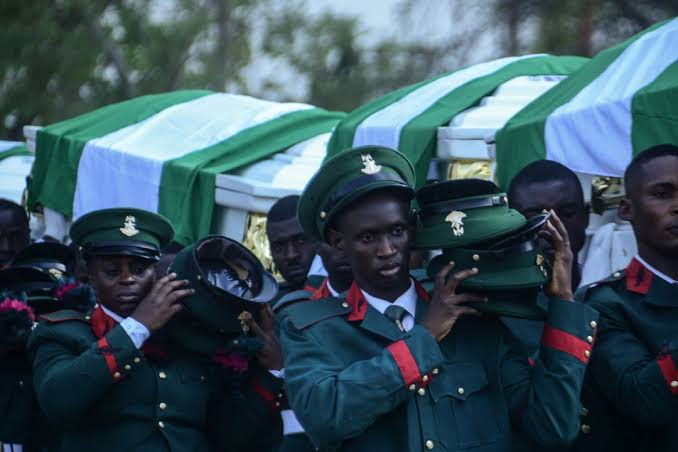Breaking News
Okuama killings: how the Army got involved
The military conducted operations in the area with civilians on occasion, particularly when necessary. As in the Okuama affair, to which some had alluded, the military conceals the citizens in military uniforms during similar missions.

The Army’s involvement in mediating intercommunal conflicts is one prominent reason why alarmed locals derided the force following the March 14 death of 17 soldiers in the Okuama community in the Ughelli South Local Government Area.
General Christopher Musa, the Chief of Defence Staff (CDS), attempted on multiple occasions to justify the officers’ and men’s disastrous “peace mission.”
Few people concur with CDS’s forceful support of his men. Still, they were all horrified by the troops’ senseless deaths.
The military Joint Task Force, or JTF, has been involved in resolving conflicts since its deployment in the region, despite their primary missions of preventing lawlessness, safeguarding the country’s oil infrastructure, and upholding peace in the oil-rich Niger Delta.
These conflicts have ranged from individual miscommunications to disputes within and between communities. But the straightforward explanation is that, as compared to other security organisations tasked with similar duties, the military unit in the area seems to be more practical, honest, and “quick” at resolving problems.
As a result, people bring miscommunications and animosities among family members—including arguments in married households—to military outposts for mediation.
The fact that military people frequently take on the duty of settling disputes amicably has further won people over to them.
Experiences of Reporters
A family dispute led to a confrontation between Chancel Bomadi’s younger sister and his brother’s wife in 2005, which resulted in Bomadi’s arrest and detention by the JTF. My younger sister bit my brother’s wife in the face during the altercation, and she then turned her rage towards me by having troops arrest me.
Sunday said, “Even though I wasn’t present for the argument that resulted in the fight, I only witnessed the soldiers being led by my brother’s wife to my room for arrest.”
“They threw me into their guardroom and detained me for hours with some others whom I met there. It was after the intervention of her husband, who told the commander then that I was innocent that they released me to settle amicably within the family.”
Furthermore, disputes between creditors, debtors, landlords, tenants, property owners, and thieves are frequently brought to the attention of the various JTF outposts for resolution. Combined military and civilian missions.
The military conducted operations in the area with civilians on occasion, particularly when necessary. As in the Okuama affair, to which some had alluded, the military conceals the citizens in military uniforms during similar missions.
For instance, Commander Major Saffa quickly organised his men to the Gbaregolor community waterfront to hire speedboats for the rescue mission when former supervisory councillor Hon. Pius Aboh ran to the Bomadi Division of the JTF and complained that the Okuama people had taken his brother, Anthony Aboh, hostage.
Sources claim that during the trip, they disguised the speedboat drivers that they hired and the former supervisory council member that accompanied them in order to identify his brother at Okuama.
The military did not anticipate the worst that would happen to them on that day; instead, they thought that they would act as a buffer between the population and any potential aggressors.
For this reason, reporters and photographers involved in UN peacekeeping operations don camouflage gear so they may continue to report and take pictures even when they are in the line of fire.
The horrors of a Supervisory Councillor burning on Stake!
village reports, however, revealed that Aboh was taken prisoner by those who ambushed the soldiers in Okuama. After diving into the river and making an attempt to swim away, Aboh was returned to the village.
A source said they tied him to a stake and burnt him alive right in the community while another source said they butchered him having identified him as an Okoloba indigene. Since the incident, nobody has heard anything about his whereabouts.


















